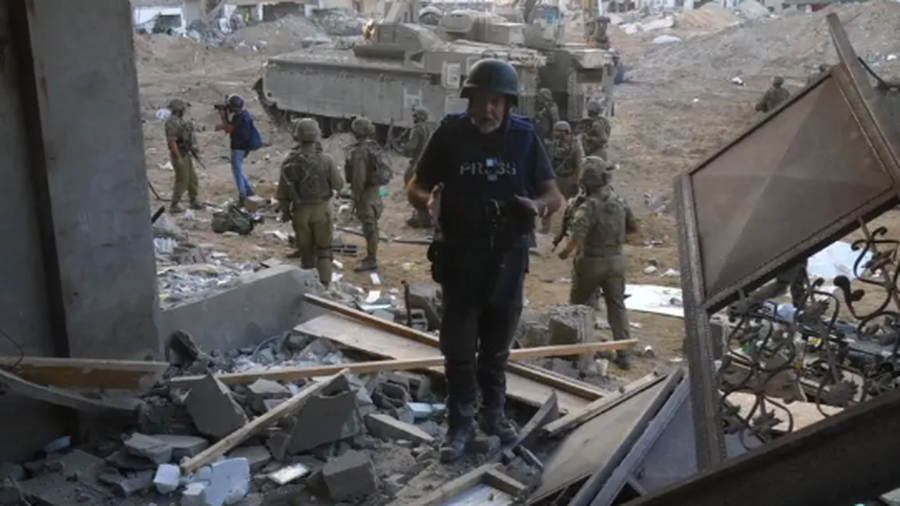
Delegations from Russia and Ukraine will meet for direct peace talks for the first time in more than three years in Istanbul. However, their composition will be at a technical level, after Russian President Vladimir Putin announced that he would not attend.
The talks will be held on May 15, at the Dolmabahçe Palace in Istanbul, and will be held privately, without the presence of the media, Russian media have reported.
Ukrainian President Volodymyr Zelensky is headed to Turkey as part of his agenda, even though Putin has declined to travel to attend the talks. Zelensky will meet with Turkish President Recep Tayyip Erdogan in Ankara but will not attend the talks in Istanbul.
He had previously stated that he was willing to meet only with Putin and not with other low-level officials from Moscow.
Expectations that US President Donald Trump might attend the talks were dashed when a Kremlin statement announced that Putin had signed an order on May 14 to appoint four negotiators and four experts to represent Russia.
Trump, who is on a four-day visit to several Middle Eastern countries, had earlier said he might stop in Turkey if it would get Putin to attend.
"I don't know if he [Putin] would go if I wasn't there," Trump told reporters from Air Force One on May 14, as he was flying from Saudi Arabia to Qatar.
"I know he would want me to be there – and that's possible. If we could stop the war, I would seriously consider it."
American media reported that American envoys, Steve Witkoff and Keith Kellogg, are expected to be in Istanbul.
The Kremlin statement confirmed that Russian Deputy Defense Minister Aleksandr Fomin, who had participated in the first talks between the parties after Russia's full invasion of Ukraine in February 2022, will be part of the Russian delegation.
The delegation will be led by Vladimir Medinsky, a Putin adviser who also participated in the last round of talks more than three years ago. Medinsky is considered an influential figure in promoting Russia's historical claims to large parts of Ukrainian territory and has authored several textbooks with nationalist interpretations of Russian history that have been contested by independent historians.
Among the appointed negotiators is Igor Kostyukov, director of the Main Intelligence Directorate (GRU) - Russia's military intelligence agency. Kostyukov is referred to by the Kremlin as the chief of the General Staff of the Russian Armed Forces.
Negotiators had held several rounds of talks in March 2022 in Belarus and Turkey, but those talks broke down without result.
Ukrainian President Zelensky, who had challenged Putin to a face-to-face meeting at the talks to be held in Istanbul, said earlier this week that Putin's absence is a clear signal that he is not really interested in peace.
"I'm waiting to see who will come from Russia. Then we will decide what steps Ukraine should take," Zelensky declared on May 14.
He had expressed his readiness for a direct meeting with Putin after the latter called for direct talks. However, Zelensky had stressed that he would not agree to meet with a Russian delegation, but only with President Putin.
Putin had proposed direct negotiations, "without any preconditions."
The talks are aimed at leading to a peace deal between Kiev and Moscow to end Europe's worst conflict since World War II. However, the absence of the presidents has significantly dampened expectations of any major progress in the process.
Skepticism about the success of the talks was present even before it became clear that neither Putin nor Trump would attend.
Lithuania's ambassador to Sweden, Linas Linkevičcius, told Current Time television that although everyone wants progress, he sees no real basis for it, as the initial positions of all parties are deeply different.
"We are not talking about the interests of Ukraine, about [Russia's] legal responsibility, which is fundamental for all the crimes that have been committed by it and its leader," Linkevicius said. "We cannot ignore these and pretend that everything is fine and we are continuing as usual."
Linkevicius predicted that Russia will make speeches about the “root causes” of the conflict and only after they are addressed may it be ready to talk about a possible ceasefire. “In other words, there will be no ceasefire again,” he said. “They will drag it out to buy time and, in my opinion, to prepare for a summer offensive.”
In an interview with the French newspaper Le Monde, the Ukrainian president's chief of staff, Andriy Yermak, stated that Putin's absence on May 15 in Turkey would be an indication that "Moscow does not want peace and is not ready for serious negotiations."
"We don't trust Russia... But we want to end this conflict and we are ready to accept any format of negotiations," Yermak told Le Monde.
Ukrainian Foreign Minister Andriy Sybiha has arrived in Antalya, on the southern coast of Turkey, where NATO Secretary General Mark Rutte is chairing an informal meeting of the alliance's foreign ministers.
US Secretary of State Marco Rubio, who is expected to participate in the peace talks along with representatives Steve Witkoff and Keith Kellogg, met with Sybihan on May 14 on the sidelines of the NATO meeting.
Sybiha wrote on the X network that he had explained “Zelensky’s vision for further peace efforts” during “this critical week.” He said that he and Rubio “discussed in detail the logic of the next steps and shared our positions.”
Meanwhile, Russia has continued its wave of drone and missile attacks on Ukraine in recent weeks, despite calls for a ceasefire.
The acting mayor of Sumy, Artem Kobzar, said that attacks in the region on May 14 left two people dead and two others injured - the death toll later rose to three./ REL (A2 Televizion)











